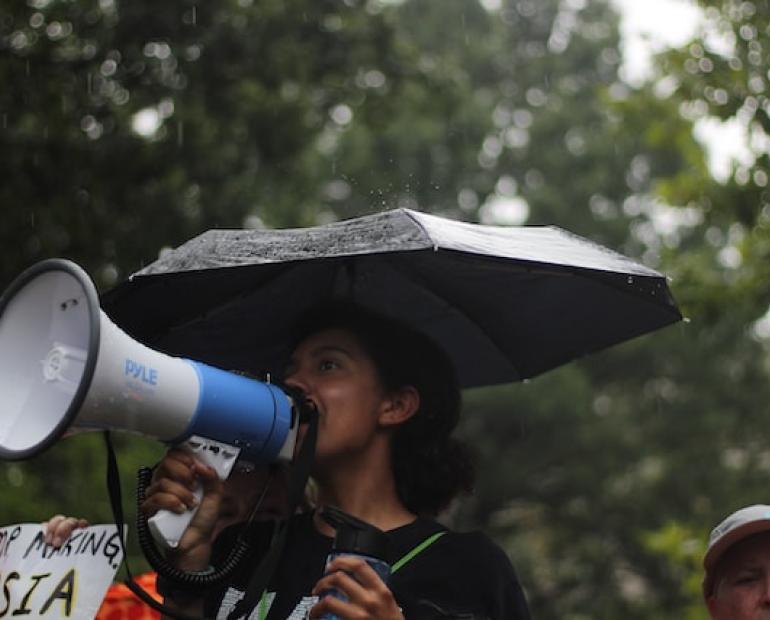
A large number of people believe the growing wealth gap between the rich and poor is a sign of a weakening democracy. Discussions surrounding whether the United States should implement a universal basic income and stronger public services have come into play. Many Americans believe that more public agencies will lead to inefficiency.
They see the government as a necessary evil, rather than a helpful tool and prefer to keep the bulk of economic power in the hands of private markets. Plenty of people also have faith in the rags-to-riches story of capitalism, that anyone who works hard can also amass wealth similar to Bill Gates or Jeff Bezos. Everyone can agree that keeping individual liberties is important to all Americans. Most in the U.S. can also rally behind the advancement of our country as a whole.
For this reason, it is important to understand that capitalism puts the bulk of economic power in the hands of a wealthy few. Ultimately, this leaves a few powerful, while the rest of the country must accept wages from their employers, no matter how low they may be. To address the tragic levels of poverty in the United States by implementing policies such as universal basic income will not only improve the economy, but also continue to protect the lives of individual Americans.
A great deal of voters who find themselves opposing left-leaning policies is because they lack trust in the government. Whether it be corrupt politicians or manipulation by the wealthy, many contrarians to the likes of Bernie Sanders and Alexandria Ocasio-Cortez believe that the government is too flawed to handle the needs of Americans efficiently. For many, less government is more efficient because local government can address the needs of everyone.
State elected officials will be working with a smaller number of constituents. This means more specialized policies that work for everybody. For example, a government in the United States that emphasizes the needs of the industrialized working class may work for the majority of the country. However, in more rural areas that specialize in agriculture or mining would not have their needs addressed at a national level. That is why it is also important to keep a considerable amount of power in not just the state government, but in individuals who know their needs. There is also a common sentiment that public welfare programs or policies such as a universal basic income or food stamps will decrease innovation and incentive to work.
The basic idea is that, if people are given food or shelter with nothing in exchange, individuals are less likely to create services or products that make life easier. They will have no incentive to, as all their basic needs are met and there would be no need to work. This would particularly impact the retail and service industry, where 64 percent of workers report feeling their job is just a way to get by. Without motivation to work for money, many jobs that are traditionally low skill or low pay will go unfilled. While these concerns of productivity are valid, I believe it is important to remember that the businesses that left-leaning platforms look to regulate are also hurting rural citizens by placing political focus on the growth of large corporations. In addition, the fact that many Americans have to work long hours to survive can also disincentivize innovation. The vast majority of American interests are covered by progressive policies that can afford them a larger safety net and a greater share of the economy.
The fact that public assistance is not as far reaching as many progressive politicians strive for is deeply hurting Americans. There is no safety net provided for even the hardest working laborers and many citizens are closer to financial turmoil than ideal. For many Americans, public assistance is a necessity, not a luxury. In the United States, around 12 percent of Americans live in poverty. Of those living in poverty, nearly 10 million people are classified as the working poor, meaning they work full or part-time jobs. Still, these efforts to make a living are not enough. The truth of the matter is, we do not live in a meritocracy. Many Americans work long, hard hours, yet still, certain demographics such as immigrants, the underemployed, and the disabled cannot make ends meet.
Large corporations work hard to maximize profit. This means cutting wages or firing employees to lower expenses. For example, the American retailer Fashion Nova was recently caught paying workers as little as 4 dollars an hour to sew clothing in Los Angeles. In many states, there are no laws protecting workers from unjust termination and fighting for higher wages is often a losing battle. In fact, nearly 3 million workers in American work at or below the federal minimum wage which is below the poverty line. Without laws to promise workers higher wages, many Americans must rely on public assistance to survive. Even still, they are not living lives of comfort. The high number of laborers living in poverty is proof of that. Policies such as universal basic income and medicare for all will work to alleviate some of the burden the working class must face to survive. The progressive movement to guarantee higher, universal wages for all Americans is not only ideal, it is necessary. It is unjust to promise Americans a dream of liberty and happiness without implementing policies to help them achieve these goals.
Not only will stronger public assistance create a safety net for individuals, it will work to maximize the United States economy and advance the nation. A universal basic income could work to grow the economy by putting money in the hands of people who will spend it. Economists estimate that a universal basic income of 12,000 dollars a year could grow the United States economy by more than 2 trillion dollars a year. Secondly, because proposed universal basic income from presidential candidates such as Andrew Yang are so low, we are unlikely to see any decline in the labor force.
In Finland, when a two-year trial of universal basic income was distributed to a small set of the population, they found that the workforce overall stayed relatively unaffected. A household of two making the 24 thousand a universal basic income would not be enough to afford a decent standard of living in any developed area, considering rent alone averages 1400 dollars across the nation.
Even with a universal basic income, Americans would still require jobs to live comfortably. This way, we can still see economic growth and a public safety net for workers by implementing the policy without seeing any negative impacts on productivity. Still, many citizens could still be skeptical about such policies.
Possible compromises could include only offering a universal basic income to persons with disabilities, employed, and those looking for work to encourage participation in the labor force. With a stipulation like this, the policy will incentivize those who are able to find work more readily in order to receive the added benefits. It will also be guaranteed to not encourage an unproductive working class by keeping employment a necessity. Even with these minor conditions, a universal basic income could be truly beneficial to growing the economy and providing assistance to Americans in need.






